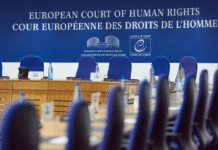The European Court of Human Rights (ECtHR) has faulted Turkey in the case of a former lawmaker who was disciplined for referring to “Kurdistan” during a parliamentary session.
The application to the court was filed by Osman Baydemir, a former deputy from the pro-Kurdish Peoples’ Democratic Party (HDP), who, during budget discussions in the Turkish parliament in 2017, was temporarily excluded from sessions after saying, “As a deputy who comes from Kurdistan, it is my wish that this roof be the common roof of Turks and Kurds.”
When other deputies shouted and the speaker asked, “Where is Kurdistan?” Baydemir replied by putting his hand on his heart and saying, “Here it is, here it is, the assembly of Kurdistan.”
In response, the deputy speaker of parliament proposed a temporary exclusion of Baydemir, invoking the rules of procedure that state that no definitions may be made about the administrative structure of the “indivisible unity of Turkey.” Parliament approved the proposal, and Baydemir was excluded from two sessions, and his salary was cut in the amount of 12,000 liras. This was the first time such a punishment was imposed on a lawmaker in parliament.
Baydemir then appealed to the Constitutional Court, which stated in its ruling that the matter did not fall within its jurisdiction because “a disciplinary penalty is not one of the parliamentary decisions for which the Constitution provides for judicial review.”
Baydemir then filed an application with the ECtHR.
In its June 13 judgment, the ECtHR found that Article 10 of the European Convention on Human Rights (ECHR) on “freedom of expression” had been violated.
Baydemir has been awarded a total of 16,957 euros, including 9,750 euros in non-pecuniary damages.
The Turkish bureaucracy and the public remain overly sensitive to the word “Kurdistan” and the tri-colored Kurdistan flag, which in some cases have been associated with “treason and terrorism” linked to the outlawed Kurdistan Workers’ Party (PKK), listed as a terrorist organization by Turkey and much of the international community.
More than 40,000 people, including 5,500 security force members, have been killed in four decades of fighting between the Turkish state and the PKK.
There have been cases of people being arrested for wearing Kurdistan T-shirts, activists detained for waving Kurdistan flags and students interrogated for tweeting pictures of the flag.
The websites of Turkey’s Presidency and Ministry of Foreign Affairs as well as the state-run Anadolu news agency refer to the Kurdistan Regional Government (KRG) in northern Iraq as Kurdistan.















